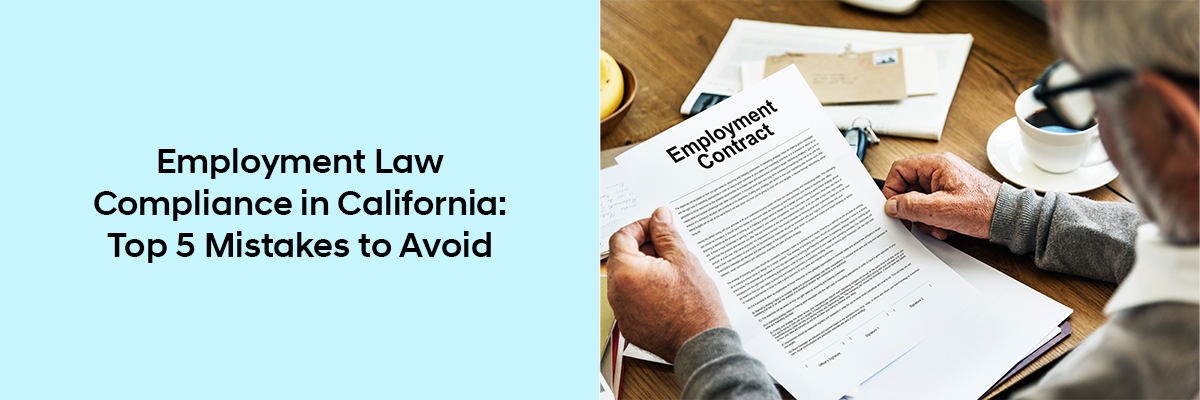California is one of the most employee-friendly states in the U.S., known for its complex and ever-evolving employment laws. Whether you’re a small business owner, an HR professional, or a compliance manager, staying ahead of the curve is critical to avoiding lawsuits, penalties, and reputational damage. Unfortunately, many employers unknowingly make costly mistakes that could have been easily avoided with the right knowledge and preparation.



Here are the top 5 employment law compliance mistakes to avoid in California:
1. Misclassifying Employees as Independent Contractors
Misclassification is one of the most common, and expensive, mistakes California employers make. Since the implementation of AB 5, the state uses the ABC Test to determine whether a worker is an independent contractor or employee. If a worker doesn’t meet all three conditions, they must be classified as an employee.
Why it matters:
Misclassification can lead to back pay, tax liabilities, unpaid benefits, and penalties from the Labor Commissioner’s Office or IRS.
How to avoid it:
- Apply the ABC test rigorously.
- Review contracts and job descriptions regularly.
- When in doubt, consult legal counsel or HR compliance experts.
2. Failing to Provide Accurate Wage Statements
California Labor Code Section 226 mandates that employers provide detailed wage statements (pay stubs) to employees. Errors such as incorrect pay rates, missing overtime details, or inaccurate hours worked can lead to serious litigation.
Why it matters:
Each wage statement violation can cost up to $4,000 per employee plus legal fees.
How to avoid it:
- Use reliable payroll software.
- Conduct regular audits of wage statements.
- Educate payroll staff on the mandatory components of a wage statement.
3. Ignoring Meal and Rest Break Regulations
California’s labor laws around meal and rest breaks are strict. Non-exempt employees are entitled to a 30-minute meal break after five hours of work and a 10-minute rest break for every four hours worked. Failing to provide these breaks, or to properly document them, can result in penalties.
Why it matters:
Employers must pay one additional hour of pay for each day a meal or rest break is not provided as required.
How to avoid it:
- Schedule breaks into employees’ workday.
- Use time-tracking systems that document breaks.
- Train managers to ensure compliance.
4. Not Keeping Up with Local Ordinances
In California, compliance doesn’t stop at the state level. Local jurisdictions such as Los Angeles, San Francisco, and San Diego have their own labor laws, including higher minimum wages, specific paid sick leave policies, and predictive scheduling requirements.
Why it matters:
Employers operating in multiple cities may unintentionally violate local laws by applying only statewide policies.
How to avoid it:
- Maintain a city-by-city compliance checklist.
- Subscribe to local government updates or compliance alerts.
- Adjust HR policies to reflect the most employee-friendly regulations applicable.
5. Incomplete or Outdated Employee Handbooks
An employee handbook isn’t just a guide for workers, it’s a legal safeguard for employers. If your handbook is outdated or missing mandatory policies (like California’s harassment prevention requirements), it could expose your company to liability.
Why it matters:
An updated handbook helps ensure consistent practices and can serve as a defense in employee disputes.
How to avoid it:
- Review and update your handbook annually.
- Include essential policies like anti-harassment, leave entitlements, remote work guidelines, and wage policies.
- Have employees sign an acknowledgment form.
We offer expert-led webinars on payroll and accounting, compliance resources, and training solutions to help businesses navigate California’s employment law landscape with confidence.
Final Thoughts
California employment law is complex, but noncompliance is not an option. Proactively addressing these common pitfalls can protect your organization from lawsuits, government audits, and brand damage. Consider investing in compliance training, regular audits, and expert consultation to keep your organization legally sound and ethically responsible.


